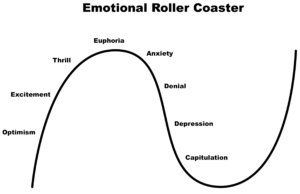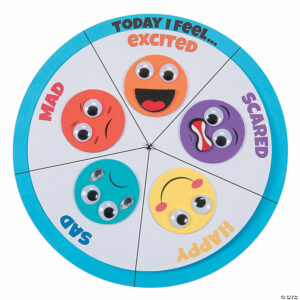Contents
What Is An Emotional Rollercoaster?
 An emotional rollercoaster can be a lot to handle. When it comes to emotions, there are many different types that we all go through in our day-to-day lives. There is no denying that our moods are affected by the people around us, what we are thinking about, and even the activities we partake in on a daily basis. But being able to identify what you are feeling can help bring awareness to your feelings at any given moment so you can begin processing them!
An emotional rollercoaster can be a lot to handle. When it comes to emotions, there are many different types that we all go through in our day-to-day lives. There is no denying that our moods are affected by the people around us, what we are thinking about, and even the activities we partake in on a daily basis. But being able to identify what you are feeling can help bring awareness to your feelings at any given moment so you can begin processing them!
An emotional rollercoaster, also known as mood swings, is a feeling that fluctuates from high to low in a short period of time. There are many different emotions we feel throughout the day and it’s important to identify them! Some people experience happiness, sadness, frustration, anxiety, guilt, or shame. If you are experiencing intense emotion, it can be helpful to take some quiet time alone or talk through how you are feeling with someone else. If the feeling is too much to process on your own, seeking out help from a therapist can also help you work through difficult feelings. It’s okay to not have all the answers when it comes to your emotions! Allowing yourself to feel whatever you are feeling in the moment can be incredibly freeing. Just remember that there is always help available if you need it. Thank you for reading.
Types Of Emotions We Experience
There are many different types of emotions that we go through every day. The most common emotions are-

Happiness– when you feel satisfied with life, and everything around you inspires joy and warmth
Anger– when you feel annoyed, irritated, or even enraged by a certain situation
Sadness– this emotion is often triggered after a difficult situation has occurred and can lead to feelings of emptiness, dismay, and sorrow.
Frustration – we all experience times in our lives where we feel overwhelmed, exhausted or even helpless. anxiety- this can be an overwhelming fear that is difficult to control and causes physical sensations such as a racing heart and shortness of breath
Guilt– when you feel bad about something you have done, either intentionally or unintentionally. shame- this is an emotion that often follows a feeling of guilt and is often intensely difficult to share with others.
These emotions can be overwhelming at times and it can be helpful to take some time for yourself. Talking about your feelings with someone you trust is also helpful! If the feeling is too much to handle on your own, reaching out for help from a therapist can help as well. You are allowed to feel whatever you are feeling in the moment- even if you don’t have the answers to why these feelings come up. Allowing yourself time to process what you’re feeling is needed before deciding on any future actions.
Ways To Identify What You Are Feeling
 It can be incredibly difficult to identify how we feel, especially when intense emotions arise! But there are many different reasons why it’s important to try and process your feelings at any given time.
It can be incredibly difficult to identify how we feel, especially when intense emotions arise! But there are many different reasons why it’s important to try and process your feelings at any given time.
- Identifying your emotions can help you figure out what needs to be done in order for you to feel better.
- Allowing yourself to identify your feelings can help differentiate between different emotions, therefore making it easier to process them once they arise.
- Identifying how you are feeling helps fight negative thoughts and can help release any tension that may be stored up within your body.
There are a few ways that you can identify what you are feeling in the moment. If you’re not sure what emotion you’re experiencing, here are four emotions and how to recognize them.
1. Happiness: A sense of well-being, contentment, or joy
2. Sadness: Discomfort or despair over something that has happened or been lost
3. Frustration: Annoyance, anger, or disappointment due to an unresolved problem
4. Anxiety: Fear of a possible negative outcome or uncertain event
If you are experiencing any of the four emotions listed above, it can be helpful to take a step back and process how you’re feeling. If the feeling is too much to handle on your own, seeking out help from a therapist can also be helpful.
Ways To Process Feelings When They Come Up

When you’re feeling an intense emotion, it can be helpful to take some time alone or talk through how you are feeling with someone else. If the feeling is too much and makes it difficult for you to function, reach out for help from a therapist. They will be able to help you process what you’re feeling and work through any difficult feelings. It’s okay not to have all the answers when it comes to your emotional state! Allowing yourself time to feel whatever you’re feeling in the moment can be incredibly freeing.
Once you have identified the emotion you are feeling, there are many different ways to begin processing it.
- Talking about how you are feeling with someone else can be incredibly helpful in releasing any built-up emotions. It can also help validate your feelings and provide support from someone else who cares about your well-being.
- Meditating can also help in processing the emotional state you are currently experiencing. This practice is different for everyone but can be incredibly helpful in recognizing emotions and letting go of the tension that may have built up within your body.
- Creating art, whether it’s drawing or writing, can also be a way to process emotions. The creative process can help you understand your feelings in a way that talking or thinking about them may not.
- Exercising can be another way to work through difficult emotions. Sweating out the built-up energy and tension can be incredibly helpful in releasing any negative feelings you are experiencing.
Ways To Cope With Your Emotions

While on the emotional rollercoaster, it is important to be mindful of the emotions that are currently experienced. It is vital that one takes time out to deal with the ups and downs. When experiencing an emotional rollercoaster, it is crucial to take time for self-care. One way of interacting with life during an emotional rollercoaster is by practicing acceptance and forgiveness. It is also important to practice gratitude. Practice gratitude because often it can allow you to recognize all of the good things in your life, even when you are feeling low. The other way to cope with emotions on an emotional rollercoaster is by developing a coping technique.
There are many different ways that you can cope with your emotions. If you’re not quite sure how to start coping with your emotions, you can start by working on some basic emotional regulation skills.
Identify And Label Your Emotions
One way to work on your emotional regulation skills is by learning how to identify and label your emotions. Once you are able to identify and label your emotions, it will be easier for you to start working on ways to cope with them. After you have worked on identifying and labeling your emotions, you can start working on some basic emotional regulation skills.
Using Distraction
One way to work on emotional regulation is by using distraction. Distraction can be helpful in the moment when you are feeling overwhelmed by your emotions. There are many different types of distraction techniques that you can use.
Some people find that listening to music or reading can help to distract them from their emotions. Other people may find that doing something physical, like going for a walk or working out, can help to distract them. There are also people who find that spending time with friends and family can be a distraction from their emotions.
Using Problem-solving

Problem-solving can help to give you a sense of control over the situation. It can also help to alleviate feelings of hopelessness and helplessness. oftentimes, when we are feeling overwhelmed emotionally, we go into a “problem-solving paralysis,” where we are unable to think clearly enough, or at all, and therefore feel stuck.
One way to problem-solve is by writing your problems down on a piece of paper. Once you have your problems written down, identify if there are any common themes throughout them. After identifying if there are any common themes throughout your problems, start brainstorming ways to solve them. Make a list of all of the possible solutions and then start working on implementing them.
Using Relaxation Techniques
When you are feeling overwhelmed by your emotions, it can be helpful to use relaxation techniques. Relaxation techniques can help you to feel more in control and can help to calm your mind and body. There are many different types of relaxation techniques that you can use.
Some people find that yoga or meditation can help to relax them. Other people find that taking a bath or reading can help to relax them. There are also people who find that listening to calming music can help to relax them.
Self-care Activities
It can be helpful to do self-care activities when you are feeling overwhelmed by your emotions. Self-care is important because it helps to keep us from becoming overwhelmed and burnt out. Oftentimes, when we experience a lot of intense emotions in a short period of time, we can feel exhausted and run down. Doing some things for yourself can help to reduce stress and move you forward.
Some people find that sitting down and having a cup of tea can help to relax them. Other people find that taking a bath or reading can help to relax them. There are also people who find that spending time with friends and family can be rejuvenating for them. It is important, though, to find what works best for you and to make time for yourself each day.
Conclusion
In conclusion, there are many different ways that you can cope with your emotions. If you are feeling overwhelmed by your emotions, it is important to seek help from a professional. They can help you to develop a coping technique that works best for you. There are also many different types of coping techniques that you can use, including using distraction, problem-solving, relaxation techniques, and self-care activities. It may sound overwhelming but these methods will help you take care of yourself in those moments when it feels impossible to do so alone.
If you are looking for affordable Online Counseling MantraCare can help: Book a trial therapy session


